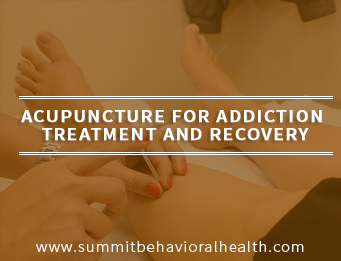
Disclaimer: Serenity at Summit no longer offers acupuncture therapy at its Haverhill location.
There are many different types of holistic therapies that can help with people who suffer from addiction. While many of them have to be used in conjunction with others to be effective, complementary and alternative medicine (CAM) therapies are becoming more popular for enhanced recovery from many medical conditions, mental illnesses, and addiction. One such treatment is acupuncture. It has been shown to be an effective treatment when added to your long-term recovery plan.
Acupuncture has long been practiced – it’s a 2,000-year-old treatment from China – and it is a low-risk treatment that can have positive effects on many body systems. Holistic drug and alcohol addiction rehabilitation facilities often use this treatment for patients alongside traditional treatments.
How Does Acupuncture Work?
Acupuncture therapy originated from traditional Chinese medicine as a way to heal illnesses and improve wellness over 2,000 years ago. Chinese medicine believes that energy flows through body pathways and that pain, illness, disease or other discomforts are thought to be blockages of the energy flow in those pathways. Acupuncture, which it the placement of very thin, sterile needles into specific areas of the skin, is used to bring the flow of energy back into balance.
Western medicine explains the benefits with neuroscience. The acupuncture points are viewed as areas where the stimulation of muscles, nerves, and body tissues increases the blood flow and triggers the release of endorphins. Acupuncture has recognizable effects on many body systems including the nervous, immune, digestive, and cardiovascular systems. There are very few known complications and side effects associated with this treatment.
Auricular Acupuncture is Used for Addiction Recovery
Acupuncture can be effective throughout all stages of addiction recovery, from detox through long-term abstinence. There is a specific acupuncture treatment that is used for those with addiction called the National Acupuncture Detoxification Association protocol.
Acupuncture has been successful in helping ease the discomfort and cravings that are associated with the withdrawal phase of addiction recovery. Additionally, it is beneficial to the rehab process, improving patients’ willingness to engage in and complete treatment. Many people use acupuncture as a tool in their long-term recovery, as well.
The auricular (ear) acupuncture treatment, also known as the NADA 5-point treatment, is done by inserting needles into five points on the outer ear area and leaving them for half an hour. The five acupuncture points in this treatment are:
Autonomic – Aids in relaxation and quiets the nervous system.
Spirit Gate – Lowers anxiety.
Kidney – Aids the healing of the body’s organs and soothes fears.
Liver – Assists with blood detoxification and lowers aggression.
Lung – Promotes air circulation and aids with calming grief.
The NADA 5-point protocol is the most common acupuncture treatment for people with addiction problems, specifically in the beginning stages of treatment. But it is only one of the numerous treatments that is successful for patients in recovery. Typically, a patient will work with an acupuncturist to determine which points will provide them with the best outcome for their specific needs.
Benefits of Acupuncture for Addiction Recovery
Everyone works a different program of addiction recovery. Successful addiction recovery is often achieved with a combination of different treatments that individuals find useful to their individual circumstances and needs. While acupuncture is not a stand-alone treatment for addiction, it does have some amazing benefits that make it a useful tool to add to a holistic recovery plan.
Relief of Anxiety and Stress
Stress and anxiety are two of the most common reasons for relapse. Preventing relapse is best managed by finding ways that reduce stress and lower anxiety. While acupuncture alone cannot remove all anxiety and stress, it has been shown to be very useful when integrated into recovering addicts’ overall stress management strategy.
Lessens Depression
Depression is a common accompaniment to drug or alcohol abuse and addiction. Acupuncture research shows that when it is used on patients in addiction recovery, the instances of depression are lower.
Decreases Cravings
Dealing with cravings is one of the most difficult aspects of recovery for many people who suffer from addiction. Acupuncture, particularly the ear acupuncture described above, can be a huge help in reducing and coping with the intense drug and alcohol cravings in early recovery.
Helps Pain Managment Without Medication
Treating acute pain is tricky for people in recovery because many painkillers are addictive, making using them a huge risk to their recovery. The use of narcotic medications for acute or chronic pain causes many people to slip back into addiction, even when painkillers were not their drug of choice. Acupuncture has been shown to alleviate pain without the use of medication, as it stimulates natural painkillers in the body.
Helps With Sleeping
Recovering addicts who have problems going to sleep or staying asleep are at risk for relapse, so ensuring that they get enough quality sleep is crucial. Many sleep medications are addictive in nature, so that is a slippery slope for those in recovery. Research suggests that acupuncture as a treatment for insomnia can be helpful without having to risk using sleep medications.
Acupuncture isn’t a cure for addiction, but it can be a very useful recovery tool to help you maintain sobriety and live your new life of recovery. It doesn’t benefit everyone in the same way, so it is important that you discuss your specific challenges and needs with a knowledgeable acupuncturist for the best results. Overall, acupuncture is a very low-risk treatment that may genuinely enhance your program of recovery.

